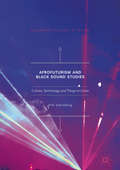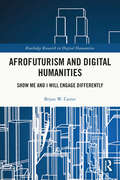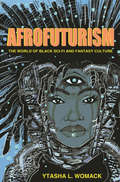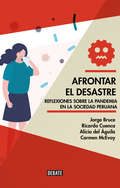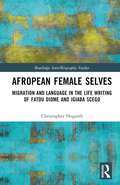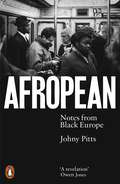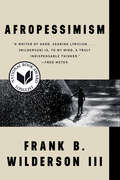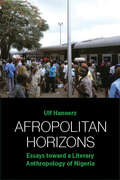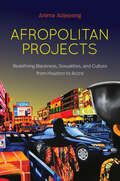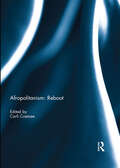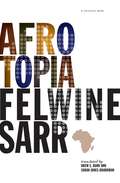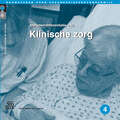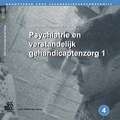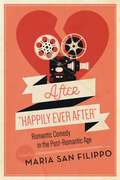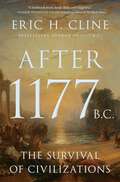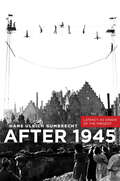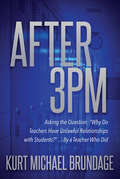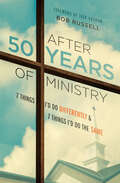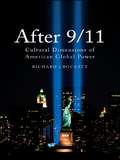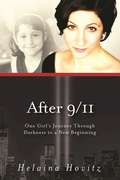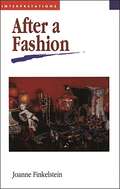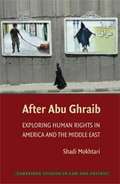- Table View
- List View
Afrofuturism and Black Sound Studies: Culture, Technology, and Things to Come (Palgrave Studies in Sound)
by Erik SteinskogThis book interrogates the meeting point between Afrofuturism and Black Sound Studies. Whereas Afrofuturism is often understood primarily in relation to science fiction and speculative fiction, it can also be examined from a sonic perspective. The sounds of Afrofuturism are deeply embedded in the speculative - demonstrated in mythmaking - in frameworks for songs and compositions, in the personas of the artists, and in how the sounds are produced. In highlighting the place of music within the lived experiences of African Americans, the author analyses how the perspectives of Black Sound Studies complement and overlap with the discussion of sonic Afrofuturism. Focusing upon blackness, technology, and sound, this unique text offers key insights in how music partakes in imagining and constructing the future. This innovative volume will appeal to students and scholars of sound studies, musicology and African American studies.
Afrofuturism and Digital Humanities: Show Me and I Will Engage Differently
by Bryan W. CarterThis book brings Afrofuturism into conversation with digital humanities to pioneer the field of Digital Africana Studies, and shows how students and academics can engage with the vision of Afrofuturism, both theoretically and practically, in the classroom and through research. As Black people across the globe consider their place in the future following the past two decades of technological advancement, Afrofuturism and its relevance for the humanities has become ever pertinent. While Afrofuturism has thus far been discussed through a literary, artistic, or popular culture lens, growing use of new technologies, and its resultant intersections with the reality of our racial experiences, has created a need for approaching Afrofuturism from a digital studies perspective. Via detailed case studies, Bryan W. Carter introduces the field of Digital Africana Studies to demonstrate how this new area can be experienced pedagogically. Alongside the book, readers can also visit select Digital Africana Studies projects that exemplify the various technologies and projects described at the author’s website: ibryancarter.com/projects. Given its unique approach to the path-breaking tradition of Afrofuturism, the book will be indispensable for scholars and students across fields such as digital humanities, media studies, black studies, African American studies, and Africana studies.
Afrofuturism: The World of Black Sci-Fi and Fantasy Culture
by Ytasha WomackComprising elements of the avant-garde, science fiction, cutting-edge hip-hop, black comix, and graphic novels, Afrofuturism spans both underground and mainstream pop culture. With a twofold aim to entertain and enlighten, Afrofuturists strive to break down racial, ethnic, and all social limitations to empower and free individuals to be themselves. This book introduces readers to the burgeoning artists creating Afrofuturist works, the history of innovators in the past, and the wide range of subjects they explore. From the sci-fi literature of Samuel Delany, Octavia Butler, and NK Jemisin to the musical cosmos of Sun Ra, George Clinton, and the Black Eyed Peas' will.i.am, to the visual and multimedia artists inspired by African Dogon myths and Egyptian deities, topics range from the "alien" experience of blacks in America to the "wake up" cry that peppers sci-fi literature, sermons, and activism. Interviews with rappers, composers, musicians, singers, authors, comic illustrators, painters, and DJs, as well as Afrofuturist professors, provide a firsthand look at this fascinating movement.
Afrontar el desastre: Reflexiones sobre la pandemia en la sociedad peruana
by JORGE BRUCE Carmen McEvoy RICARDO CUENCAUn e-book que analiza los comportamientos de los peruanos y peruanas en tiempos de pandemia Afrontar el desastre. Reflexiones sobre la pandemia en la sociedad peruana reúne cuatro textos para repensar los impactos y consecuencias del COVID-19 en la vida cotidiana de los peruanos y peruanas durante el encierro. Las restricciones y el confinamiento en el Perú han generado una sensación de incertidumbre sobre el futuro para muchos ciudadanos. En este contexto, los ensayos del psicoanalista Jorge Bruce, Ricardo Cuenca, director general e investigador del Instituto de Estudios Peruanos (IEP), la socióloga Alicia del Águila y la historiadora Carmen McEvoy, cuestionan la función de las instituciones estatales, la transgresión de las normas, la precariedad del sistema y los temores profundos que esta pandemia ha agudizado.
Afropean Female Selves: Migration and Language in the Life Writing of Fatou Diome and Igiaba Scego (Routledge Auto/Biography Studies)
by Christopher HogarthAfropean Female Selves: Migration and Language in the Life Writing of Fatou Diome and Igiaba Scego examines the corpus of writing of two contemporary female authors. Both writers are of African descent, live in Europe and write about lives across Europe and Africa in different languages (French and Italian). Their work involves episodes from their lived experience and complicates Western understandings of life writing and autobiography. As Hogarth shows in this study, the works of Diome and Scego encapsulate the new and complex identities of contemporary "Afropeans." As an identity coined and used frequently by prominent authors and critics across Europe, Africa and North America, the notion of "Afropean" is at the cutting edge of cultural analyses today. Yet each writer occupies unique and different positions within this debated category. While Scego is a "post-migratory subject" in postcolonial Europe, Diome is an African writer who has migrated to Europe in her adult life. This book examines the different trajectories and packaging of these two specific postcolonial writers in the Francophone and Italophone contexts, pointing out how and where each author practices life writing strategies and scrutinizing the trend that emphasizes the life writing, autofictional, or autoethnographic strategies of African diasporic writers. Afropean Female Selves offers a comparative study across two languages of a notion that has so far been explored mainly in English. It explores the contours of this new discursive category and positions it in regard to other notions of Afrodiasporic identity, such as Afropolitan and Afro-European.
Afropean: Notes from Black Europe
by Johny PittsWinner of the Jhalak Prize'A revelation' Owen Jones'Afropean seizes the blur of contradictions that have obscured Europe's relationship with blackness and paints it into something new, confident and lyrical' Afua Hirsch A Guardian, New Statesman and BBC History Magazine Best Book of 2019 'Afropean. Here was a space where blackness was taking part in shaping European identity ... A continent of Algerian flea markets, Surinamese shamanism, German Reggae and Moorish castles. Yes, all this was part of Europe too ... With my brown skin and my British passport - still a ticket into mainland Europe at the time of writing - I set out in search of the Afropeans, on a cold October morning.'Afropean is an on-the-ground documentary of areas where Europeans of African descent are juggling their multiple allegiances and forging new identities. Here is an alternative map of the continent, taking the reader to places like Cova Da Moura, the Cape Verdean shantytown on the outskirts of Lisbon with its own underground economy, and Rinkeby, the area of Stockholm that is eighty per cent Muslim. Johny Pitts visits the former Patrice Lumumba University in Moscow, where West African students are still making the most of Cold War ties with the USSR, and Clichy Sous Bois in Paris, which gave birth to the 2005 riots, all the while presenting Afropeans as lead actors in their own story.
Afropessimism
by Frank B. Wilderson III“Wilderson’s thinking teaches us to believe in the miraculous even as we decry the brutalities out of which miracles emerge”—Fred Moten Praised as “a trenchant, funny, and unsparing work of memoir and philosophy” (Aaron Robertson,?Literary Hub), Frank B. Wilderson’s Afropessimism arrived at a moment when protests against police brutality once again swept the nation. Presenting an argument we can no longer ignore, Wilderson insists that we must view Blackness through the lens of perpetual slavery. Radical in conception, remarkably poignant, and with soaring flights of memoir, Afropessimism reverberates with wisdom and painful clarity in the fractured world we inhabit.“Wilderson’s ambitious book offers its readers two great gifts. First, it strives mightily to make its pessimistic vision plausible. . . . Second, the book depicts a remarkable life, lived with daring and sincerity.”—Paul C. Taylor, Washington Post
Afropolitan Horizons: Essays toward a Literary Anthropology of Nigeria
by Ulf HannerzNigeria is a country shaped by internal diversity and transnational connections, past and present. Leading Nigerian writers from Chinua Achebe, Amos Tutuola and Wole Soyinka to Chimamanda Ngozi Adichie and Teju Cole have portrayed these Nigerian issues, and have also written about some of the momentous events in Nigerian history. Afropolitan Horizons discusses their work alongside other novelists and commentators, as well as describing the ways in which Nigeria has appeared in foreign news reporting. It is all interwoven with the author’s own anthropological field research in a town in Central Nigeria.
Afropolitan Projects: Redefining Blackness, Sexualities, and Culture from Houston to Accra
by Anima AdjepongBeyond simplistic binaries of "the dark continent" or "Africa Rising," Africans at home and abroad articulate their identities through their quotidian practices and cultural politics. Amongst the privileged classes, these articulations can be characterized as Afropolitan projects--cultural, political, and aesthetic expressions of global belonging rooted in African ideals. This ethnographic study examines the Afropolitan projects of Ghanaians living in two cosmopolitan cities: Houston, Texas, and Accra, Ghana. Anima Adjepong's focus shifts between the cities, exploring contests around national and pan-African cultural politics, race, class, sexuality, and religion. Focusing particularly on queer sexuality, Adjepong offers unique insight into the contemporary sexual politics of the Afropolitan class. The book expands and complicates existing research by providing an in-depth transnational case study that not only addresses questions of cosmopolitanism, class, and racial identity but also considers how gender and sexuality inform the racialized identities of Africans in the United States and in Ghana. Bringing an understudied cohort of class-privileged Africans to the forefront, Adjepong offers a more fully realized understanding of the diversity of African lives.
Afropolitanism: Reboot
by Carli CoetzeeThis edited collection comprises an original and activist group of contributions on that much maligned figure, the Afropolitan. The contributors do not aim to define or fix the term anew; the reboot is, instead, the beginnings of an activist scholarly agenda in which ‘the Afropolitan’ is reimagined to include the stealthy figure crossing the Mediterranean by boat, and the Somali shopkeeper in a South African township. In their pieces included here, the authors insist on the need to ask questions about the inclusion of such globally mobile Africans in any theorisations of the transnational circuits we call Afropolitan. This collection, from some of the foremost voices on Afropolitanism, invigorates anew the debate, and reboots understandings of who the Afropolitan is, the many places he calls his origin, and the multiple places she comes to call home in the world. The chapters in this book were originally published in the Journal of African Cultural Studies.
Afrotopia (Univocal)
by Felwine SarrA vibrant meditation and poetic call for an African utopian philosophy of self-reinvention for the twenty-first century In the recent aftermath of colonialism, civil wars, and the AIDS crisis, a new day finally seems to be shining on the African continent. Africa has once again become a site of creative potential and a vibrant center of economic growth and production. No longer stigmatized by stereotypes or encumbered by the traumas of the past—yet unsure of the future—Africa has other options than simply to follow paths already carved out by the global economy. Instead, the philosopher Felwine Sarr urges the continent to set out on its own renewal and self-discovery—an active utopia that requires a deep historical reflection on the continent&’s vast mythological universe and ancient traditions, nourishes a cultural reinvention, and embraces green technologies for tackling climate change and demographic challenges.Through a reflection on contemporary African writers, artists, intellectuals, and musicians, Sarr elaborates Africa&’s unique philosophies and notions of communal value and economy deeply rooted in its ancient traditions and landscape—concepts such as ubuntu, the life force in Dogon culture; the Rwandan imihigo; and the Senegalese teranga. Sarr takes the reader on a philosophical journey that is as much inward as outward, demanding an elevation of the collective consciousness.Along the way, one sees the contours of an africanity, a contemporary Africa united as a continent through the creolization of its cultural traditions. This is Felwine Sarr&’s Afrotopia.
Afspraak met moord (Afrikaans Edition)
by Jana MarxElf wrede moorde oor ’n tydperk van vier jaar ruk die gemeenskap van Krugersdorp en haal landwyd nuusopskrifte. Eindelik word al hierdie moorde verbind met Cecilia Steyn en haar kultusgroep, Electus per Deus (uitverkies deur God). Lede van die groep aanbid die grond waarop Cecilia loop en sal selfs vir haar moord pleeg. Die moordenaars is slim, gewone mense – ’n onderwyseres, ’n finansiële makelaar, ’n kind wat tussen die moorde deur steeds ses onderskeidings in matriek behaal en boonop keuring kry om medies te gaan studeer. Hul slagoffers het bloot ’n sake- afspraak nagekom, min wetend dat dít ’n afspraak met die dood was. Wie is Cecilia Steyn? Hoe kan een mens vyf ander manipuleer om moord te pleeg en namens haar in die hof te lieg? Watter rol het Satanisme gespeel? Hoe ontduik onervare misdadigers die polisie vir so lank? Jana Marx beantwoord dié en ander vrae in ’n waremisdaad-verhaal wat gelei het tot een van die opspraakwekkendste moordsake in die land se geskiedenis. Met behulp van onderhoude uit diegene in die binnekring, hofgetuienis en polisiedossiere oor ’n tydperk van vier jaar poog Marx om die publiek se vrae te antwoord en ’n blik te gee op die binnewerkinge van só ’n kultus.
Afstudeerdifferentiatie 412 Klinische zorg: Niveau 4
by Hanny Sluis Jan H.J. JongDit katern is geschreven voor BOL- en BBL-studenten die in de laatste fase zijn gekomen van de opleiding tot verpleegkundige. Het katern is een hulpmiddel bij het afstuderen en reikt verschillende mogelijkheden voor binnen en buitenschoolse verdieping aan. In het eerste hoofdstuk wordt de voorbereiding op de differentiatie belicht. In hoofdstuk 2 leert de student een eigen opfrisschema samen te stellen. Daarmee kan hij of zij de eerder eigen gemaakte leerstof die nodig is voor de differentiatie weer op een rijtje zetten en gebruiken als basis voor de verdieping. Tevens bevat dit hoofdstuk een uitgebreide lijst van informatiebronnen. In hoofdstuk 3 zijn casussen opgenomen die dienen als basis om te verdiepen en als leidraad voor het afstudeerproces en product.
Afstudeerdifferentiatie 414 Psychiatrie en verstandelijk gehandicaptenzorg 1
by Hanny Sluis Jan H.J. JongDifferentiatiekatern voor BOL- en BBL studenten die in de laatste fase zijn gekomen van de opleiding tot verpleegkundige niveau 4. Het katern is een hulpmiddel bij het afstuderen en reikt verschillende mogelijkheden voor binnen- en buitenschoolse verdieping aan. In de casuïstiek in dit katern komen de eindtermen van deelkwalificatie 414 meerdere malen op verschillende wijze aan bod. Gedurende de BPV toont de deelnemer dat hij/zij in staat is als verpleegkundige zorg te verlenen aan zorgvragers met een psychiatrische ziekte of verstandelijke handicap (414.03). Het kunnen toepassen van GVO (414.04) wordt eveneens in de BPV getoond. Ook het kunnen coördineren van zorg (414.05) wordt in de BPV getoond. De subeindtermen zijn vertaald in taken bij de casussen. Het bevorderen van kwaliteitszorg en deskundigheidsbevordering ten aanzien van psychiatrie en verstandelijk gehandicaptenzorg (413.06) wordt geleerd met behulp van projecttaken.
After "Happily Ever After": Romantic Comedy in the Post-Romantic Age (Contemporary Approaches to Film and Media Series)
by Maria San Filippo Deborah Jermyn Martha Shearer John Alberti James MacDowell Tom Cunliffe Beatriz Oria Betty Kaklamanidou Mary Harrod Maya Montañez Smukler Elizabeth Alsop Alice Guilluy Ash Kinney D'Harcourt Tamar Jeffers MacDonald Sueyoung Park-Primiano Manuela RuizIn defiance of the alleged "death of romantic comedy," After "Happily Ever After": Romantic Comedy in the Post-Romantic Age edited by Maria San Filippo attests to rom-com’s continuing vitality in new modes and forms that reimagine and rejuvenate the genre in ideologically, artistically, and commercially innovative ways. No longer the idyllic fairy tale, today’s romantic comedies ponder the realities and complexities of intimacy, fortifying the genre’s gift for imagining human connection through love and laughter. It has often been observed that the rom-com’s "happily ever after" trope enables the genre to avoid addressing the challenges of coupled life. This volume’s contributors confront how recent rom-coms contend with a "post-romantic age" of romantic disillusionment and seismically shifting emotional and relational bonds. Fifteen chapters contemplate the resurgence of the "radical romantic comedy" and uncoupling comedy, new approaches in genre hybridity and serial narrative, and how recent rom-coms deal with divisive topical issues and contemporary sexual mores from reproductive politics and marriage equality to hook-up culture and technology-enabled sex. Rom-coms remain underappreciated and underexamined—and still largely defined within Hollywood’s parameters of culturally normative coupling and its persistent marginalization of racial and sexual minorities. Making the case for taking romantic comedy seriously, this volume employs critical perspectives drawn from feminist, queer, postcolonial, and race studies to critique the genre’s homogeneity and social and sexual conservatism, recognizing innovative works inclusive of LGBTQ people, people of color, and the differently aged and abled. Encompassing a rich range of screen media from the last decade, After "Happily Ever After" celebrates works that disrupt and subvert rom-com fantasy and formula so as to open audience’s eyes along with our hearts. This volume is intended for all readers with an interest in film, media, and gender studies.
After 1177 B.C.: The Survival of Civilizations (Turning Points in Ancient History #12)
by Eric H. ClineIn this gripping sequel to his bestselling 1177 B.C., Eric Cline tells the story of what happened after the Bronze Age collapsed—why some civilizations endured, why some gave way to new ones, and why some disappeared forever&“A landmark book: lucid, deep, and insightful. . . . You cannot understand human civilization and self-organization without studying what happened on, before, and after 1177 B.C.&”—Nassim Nicholas Taleb, bestselling author of The Black SwanAt the end of the acclaimed history 1177 B.C., many of the Late Bronze Age civilizations of the Aegean and Eastern Mediterranean lay in ruins, undone by invasion, revolt, natural disasters, famine, and the demise of international trade. An interconnected world that had boasted major empires and societies, relative peace, robust commerce, and monumental architecture was lost and the so-called First Dark Age had begun. Now, in After 1177 B.C., Eric Cline tells the compelling story of what happened next, over four centuries, across the Aegean and Eastern Mediterranean world. It is a story of resilience, transformation, and success, as well as failures, in an age of chaos and reconfiguration.After 1177 B.C. tells how the collapse of powerful Late Bronze Age civilizations created new circumstances to which people and societies had to adapt. Those that failed to adjust disappeared from the world stage, while others transformed themselves, resulting in a new world order that included Phoenicians, Philistines, Israelites, Neo-Hittites, Neo-Assyrians, and Neo-Babylonians. Taking the story up to the resurgence of Greece marked by the first Olympic Games in 776 B.C., the book also describes how world-changing innovations such as the use of iron and the alphabet emerged amid the chaos.Filled with lessons for today's world about why some societies survive massive shocks while others do not, After 1177 B.C. reveals why this period, far from being the First Dark Age, was a new age with new inventions and new opportunities.
After 1945: Latency as Origin of the Present
by Hans Ulrich GumbrechtWhat is it the legacy that humankind has been living with since 1945? We were once convinced that time was the agent of change. But in the past decade or two, our experience of time has been transformed. Technology preserves and inundates us with the past, and we perceive our future as a set of converging and threatening inevitabilities: nuclear annihilation, global warming, overpopulation. Overwhelmed by these horizons, we live in an ever broadening present. In identifying the prevailing mood of the post-World War II decade as that of "latency," Gumbrecht returns to the era when this change in the pace and structure of time emerged and shows how it shaped the trajectory of his own postwar generation. Those born after 1945, and especially those born in Germany, would have liked nothing more than to put the catastrophic events and explosions of the past behind them, but that possibility remained foreclosed or just out of reach. World literatures and cultures of the postwar years reveal this to have been a broadly shared predicament: they hint at promises unfulfilled and obsess over dishonesty and bad faith; they transmit the sensation of confinement and the inability to advance. After 1945 belies its theme of entrapment. Gumbrecht has never been limited by narrow disciplinary boundaries, and his latest inquiry is both far-ranging and experimental. It combines autobiography with German history and world-historical analysis, offering insightful reflections on Samuel Beckett and Paul Celan, detailed exegesis of the thought of Martin Heidegger and Jean Paul Sartre, and surprising reflections on cultural phenomena ranging from Edith Piaf to the Kinsey Report. This personal and philosophical take on the last century is of immediate relevance to our identity today.
After 3PM: Asking the Question: “Why Do Teachers Have Unlawful Relationships with Students?" . . .by a Teacher Who Did
by Kurt Michael BrundageAcross the United States, almost daily, a news story is reported about another teacher who was recently arrested for having an inappropriate relationship with a student. And every time, principals across the country do exactly the same thing: absolutely nothing. After 3PM is an exploration of this damaging epidemic within the school systems — asking the question: &“Why do teachers have unlawful relationships with students?&” ...by a teacher who did.
After 50 Years of Ministry: 7 Things I'd Do Differently and 7 Things I'd Do the Same
by Bob Russell&“If I had my entire life to live over, I&’d choose to be a preacher again. It&’s been extremely rewarding and gratifying.But I could do ministry a lot better if given a second try. As I look back on my forty years at Southeast Christian Church in Louisville, KY, I wish I had a mulligan. This book lists seven things I&’d do differently and seven I&’d do about the same. They are written in hopes they&’ll be a source of encouragement for those growing weary and losing heart. I pray my observations will inspire others to conclude, &‘If he can do it, I can, too.&’In this book I share both the joys and sorrows of my ministry, both the successes and failures. I&’m going to be as transparent as possible in hopes that it will encourage ministers to stand firm in the faith and be faithful unto death. If just one minister is motivated to pick up the sword of the Spirit and re-enter the battle, it will be well worth the effort.&”— Bob Russell
After 50 Years of Ministry: 7 Things I'd Do Differently and 7 Things I'd Do the Same
by Bob Russell&“If I had my entire life to live over, I&’d choose to be a preacher again. It&’s been extremely rewarding and gratifying.But I could do ministry a lot better if given a second try. As I look back on my forty years at Southeast Christian Church in Louisville, KY, I wish I had a mulligan. This book lists seven things I&’d do differently and seven I&’d do about the same. They are written in hopes they&’ll be a source of encouragement for those growing weary and losing heart. I pray my observations will inspire others to conclude, &‘If he can do it, I can, too.&’In this book I share both the joys and sorrows of my ministry, both the successes and failures. I&’m going to be as transparent as possible in hopes that it will encourage ministers to stand firm in the faith and be faithful unto death. If just one minister is motivated to pick up the sword of the Spirit and re-enter the battle, it will be well worth the effort.&”— Bob Russell
After 9/11: Cultural Dimensions of American Global Power
by Richard CrockattThis is a readable and incisive analysis of American foreign policy and international politics since the end of the Cold War. It is organized around two key themes, the role of culture in international politics and the changing nature of American power. Richard Crockatt addresses such key issues as: the relationship between US power and the post-Cold War international system US relations with Europe and Islam the intensity of anti-American feeling after September 11th the rebirth of American nationalism the war in Iraq and its aftermath. After 9/11 is a much-needed balanced account of the most significant political questions of the twenty-first century
After 9/11: One Girl's Journey through Darkness to a New Beginning
by Jasmin Lee Cori Helaina Hovitz“You are a herald for your generation....Thank you for using your voice to help us make sense of that dark day, and forge a new beginning.”—Hillary Rodham Clinton, in a letter to Helaina Hovitz Helaina Hovitz was twelve years old and in middle school just blocks away when the World Trade Center was attacked. Her memoir encapsulates the journey of a girl growing up with PTSD after living through the events firsthand. After 9/11 chronicles its effects on a young girl at the outset of adolescence, following her as she spirals into addiction and rebellion, through loss, chaos, and confusion.The events of 9/11 were a very real part of Helaina’s life and are still vivid in her memory today. Hundreds were stranded in the neighborhood, including Helaina, without phones or electricity or anyone to help. Fear and despair took over her life. It would take Helaina more than a decade to overcome the PTSD — and subsequent alcohol addiction — that went misdiagnosed and mistreated. In many ways, After 9/11 is the story of a generation growing up in the aftermath of America’s darkest day —and for one young woman, it is the story of a survivor who, after witnessing the end, got to make a new beginning. This new trade paperback edition includes tips on how to cope with trauma, an FAQ section, and a guide to discussing 9/11 with children. “Inspirational, courageous and beautifully told. After 9/11 is a testament to the resiliency of the human spirit.” — Cathy Free, correspondent, PEOPLE magazine“Helaina Hovitz's engrossing narrative begins in the shadow of the twin towers with her as a backpack-toting twelve-year-old and plays out over the next fifteen years in dramatic - and sometimes distressing - detail. This impressive debut is both deeply evocative and intensely personal.” — Peter Canby, Senior Editor, The New Yorker“A moving and remarkable testament to a time that changed our country, told beautifully by a young woman who never gave up hope that she could reclaim her life, no matter how grim things looked.” — Sean Elder, contributor, Newsweek
After 9/11: Solutions For A Saner World
by Don Hazen Tate Hausman Tamara Straus Michelle ChiharaEssays, from the progressive point of view, on various aspects of the 9/11 events, their causes, aftermath and what to do so that all may live in a safer, saner world in the future.
After A Fashion
by Joanne FinkelsteinFashion is more that supermodels in odd clothes pouting and pirouetting on Parisian catwalks. Commentators and theorists have variously seen fashion as a social, economic or aesthetic force, or sometimes as all three at once. Fashion helps to form our individual identities and lets us stand out from the crowd. Fashion appears to be novel. At the same time it preserves the status quo: it makes us think that change is occurring when the opposite is closer to the truth. After a Fashion investigates the different sides of this hybrid phenomenon. Joanne Finkelstein considers fashion in its various guises-as body decoration and costume, as a language and form of irrational play, as an expression of sexuality and part of the urban experience. Drawing on economics, art psychology, commerce, history and the everyday, she traces and analyses the multiple influences that, in the name of fashion, affect the ways we think and act.
After Abu Ghraib: Exploring Human Rights in America and the Middle East
by Shadi MokhtariThis book traverses three pivotal human rights struggles of the post-September 11th era: the American human rights campaign to challenge the Bush administration's "War on Terror" torture and detention policies, Middle Eastern efforts to challenge American human rights practices (reversing the traditional West to East flow of human rights mobilizations and discourses), and Middle Eastern attempts to challenge their own leaders' human rights violations in light of American interventions. This book presents snapshots of human rights being appropriated, promoted, claimed, reclaimed, and contested within and between the American and Middle Eastern contexts. The inquiry has three facets: first, it explores intersections between human rights norms and power as they unfold in the era. Second, it lays out the layers of the era's American and Middle Eastern encounter on the human rights plane. Finally, it draws out the era's key lessons for moving the human rights project forward.
